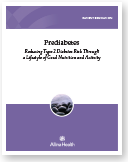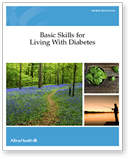
Diabetes
Living with diabetes can be a challenge. You are a key player on your health care team when it comes to managing your diabetes. Whether you have just been told that you have diabetes or you've had the disease for years, we can help you manage your health.
This written content and videos will provide you with the information you need to know about diabetes. Talk with your diabetes educator or health care provider about your current health.
Allina Health patient education manuals

Prediabetes: Reducing Type 2 Diabetes Risk Through a Lifestyle of Good Nutrition and Activity
This comprehensive manual can help you understand what prediabetes is, if you are at risk for type 2 diabetes, and how to prevent diabetes by making small lifestyle changes.

Gestational Diabetes: When You Have Diabetes during Pregnancy
Unlike other forms of diabetes, gestational diabetes lasts only as long as you are pregnant. This manual can help you understand what's happening to your body, how gestational diabetes is affecting you and your baby, and how it can be controlled.

Basic Skills for Living with Diabetes
Whether you have just been told that you have diabetes or you've had the disease for years, we can help you manage your diabetes. This manual by the Allina Diabetes Education Council includes what people with diabetes need to know.
Diabetes is a lifelong disease that cannot be cured but it can be controlled. This chapter contains information on how diabetes affects your body; how food, physical activity, stress management and medicines can help you control your diabetes; and how to use a diabetes management plan.
This chapter will help you understand the importance of regular blood glucose testing (hour-to-hour or day-to-day management) and A1c tests (overall picture of your diabetes control). You need both types of testing to manage your diabetes well.
You can make a difference in your blood glucose control through your food choices. This chapter will help you understand how food affects your body and how making good food choices can help you manage your diabetes.
Alcohol is not converted into glucose, but it can affect blood glucose levels. If your health care provider says that you can drink alcohol, this chapter will help you make better choices about what and how much you drink.
Physical activity and exercise are important for everyone, but especially for people with diabetes. This chapter will help you determine the best exercise plan for you and how to get started.
When you have diabetes, it’s important to achieve or maintain a healthy weight. This chapter will give you information about what it takes to lose weight and tips to help you get started.
Everyone has stress in life but too much stress can cause your blood glucose to go up. This chapter will help you understand stress and give you ways to manage it.
Some people need to take pills to help control blood glucose levels. This chapter will list medicines you may need to take to help manage your diabetes. Your health care provider will decide what pill or pills will be most helpful to you.
Insulin is a hormone that is made by the pancreas. If your pancreas does not make any insulin or does not make enough insulin, your health care provider may want you to take injections (shots) of insulin. This chapter will help you understand insulin and how to give yourself injections.
Hypoglycemia means that your blood glucose is low. This chapter will describe the symptoms of hypoglycemia and how to treat it.
Hyperglycemia means that your blood glucose is above your target range. This chapter will describe the symptoms of hyperglycemia and how to treat it.
Illness may cause blood glucose levels to rise. This chapter will help you understand what you can do and when to call your health care provider.
Good personal care can prevent problems caused by diabetes. This chapter will help you understand why taking good care of your feet, skin and teeth is important when you have diabetes, and what you can do to make sure you’re taking good care of yourself.
Over time, diabetes-related risk factors such as high blood glucose, high blood fats and high blood pressure can lead to long-term (chronic) problems (complications) that can affect your heart, kidneys, eyes and nervous system. This chapter will describe these problems and help you stay healthy when you have diabetes.
Patient education videos
Explore the video library for trusted, easy-to-understand health and wellness education. View video library diabetes topics.
Place review each statement that you can answer "yes" to. The more items you check, the higher your risk for developing diabetes.
- I have a parent, brother or sister who has diabetes.
- My family background is American Indian, Asian American, black, Latino or Pacific Islander.
- I had diabetes when I was pregnant -or- I have given birth to at least one baby who weighed nine pounds or more.
- My blood pressure is 130/90 mm Hg or higher -or- my triglyceride level is 150 mg or higher.
- I am fairly inactive.
- I exercise fewer than three times a week.
- I am younger than 65 years old -and- I get little or no exercise during a typical day.
- I am older than 65 years old.
- I am overweight.
- My waist is more than 35 inches for women and 40 inches for men.
If you would like a printed, spiral-bound copy, please fill out online form.
View list of manuals and prices. All sales are final.
Related resources